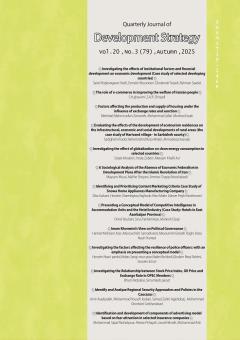Imam Khomeini's View on Political Governance
Subject Areas :
Hamed Mohseni azar
1
,
Manuchehr Samadivand
2
*
,
Masomeh Gharadaghi
3
![]() ,
reza nasiri hamed
4
,
reza nasiri hamed
4
![]()
1 - Department of Political Science and International Relations, Tabriz Branch, Islamic Azad University, Tabriz, Iran
2 - Department of History, Tabriz branch, Islamic Azad University, Tabriz, Iran (corresponding author)
3 - Department of History, Shabestar Branch, Islamic Azad University, Shabestar, Iran (corresponding author)
4 -
Keywords: Keywords: Imam Khomeini (RA), Wilayat-e Faqih, Political Government, Republic, Party.,
Abstract :
Hamed Mohseni Azar Manouchehr Samadivand Masoumeh Ghareh Daghi Reza Nasiri Hamed Abstract Imam Khomeini (RA) introduces the necessity of establishing an Islamic government as the implementation of Sharia and religious laws, believing that after the Prophet (PBUH), divine governance belonged to the Infallibles (AS), and during the occultation, the Islamic government should be under the supervision of a jurist on behalf of the Infallible Imam (AS). In Imam Khomeini's (RA) political thought, the ideal political system and government is the Islamic government. The Islamic government is not any of the existing types of government; for example, it is not despotic where the head of state is tyrannical and arbitrary. The Islamic government is neither despotic nor absolute, but constitutional. However, not in the current conventional sense where the enactment of laws depends on the opinions and majority of individuals. It is constitutional in these sense that the rulers are bound in implementation and administration to a set of conditions specified in the Holy Quran and the Sunnah of the Prophet (PBUH). The set of conditions refers to the Islamic laws and regulations that must be observed and implemented. Therefore, an Islamic government is a government of God's law over the people. During the occultation of the Infallible Imams, an Islamic government can be formed and administered by the Supreme Jurisprudent (Wilayat-e Faqih). An Islamic government is necessary for the implementation of Islamic Sharia. Imam Khomeini (RA) was able to revive the intellectual tradition of Islamic government, to which he belonged and which had declined after the execution of Sheikh Fazlullah, by resorting to the concepts of democratic tradition, Shiite constitutionalist views, and even some views of the leftist intellectual tradition, while preserving its core intellectual elements.
منابع
- اسناد انقلاب اسلامی(۱۳۷۴): تهران.مرکز اسناد انقلاب اسلامی، ج چهارم
- انصاری، حمید(1392):حدیث بیداری، تهران: موسسه چاپ و نشر عروج.
- پارسانيا، حميد(1380): حديث پيمانه، چ پنجم، قم: انتشارات معارف.
- جمشیدی، محمدحسين(1385): انديشه سياسي امام خميني(ره)، تهران: پژوهشكده امام خميني(ره) و انقلاب اسلامي، معاونت پژوهشي.
- خميني، روح الله(١٣٧٨): ولايت فقيه، تهران، مؤسسه تنظيم و نشر آثار امام خميني(ره).
- -----------(۱۳۷9): صحیفة نور، مجموعه آثار امام خمینی(ره)، تهران: موسسه تنظیم و نشر آثار امام خمینی(ره)، ج 1و4 و5 و 6 و 11 و 15
- ----------(1388): کشف الاسرار، چ اول، انتشارات شرکت کتاب.
- رجبی،محمدحسن(۱۳۷۷): زندگینامه سیاسی امام خمینی،تهران: مرکزاسناد انقلاب اسلامی.
- رنجبر کرمانی، علی اکبر(1389): روزشمار زندگی امام خمینی(س)، تهران: موسسه تنظیم و نشر آثار امام خمینی(س)، موسسه چاپ و نشر عروج.
- رهبرعباسعلی، و حسن صادقیان کمارعلیا(1392): قالب نهادهاي مدني ايران در عصر پهلوي،فصلنامه علمی مطالعات انقلاب اسلامی،دوره دهم،شماره سی وپنج،صص.179-192.
- فوزی تویسرکانی ، یحیی(1392): تحولات سياسي اجتماعي بعد از انقلاب اسلامي در ايران، ج1، تهران: موسسه تنظیم و نشر آثار امام خمینی(س)، موسسه چاپ و نشر عروج.
- قرشي، يوسف، جميري، محمد(1387): اصل چهار ترومن در ايران، فصلنامه تاريخ معاصر ايران، شماره46، صص102-71.
- نصیری(رضی)، محمد و دیگران(1394): رهیافت تحلیلی به وصیت نامه سیاسی– الهی امام خمینی(ره) (درسنامه)، تهران: سازمان چاپ و انتشارات دانشگاه آزاد اسلامی.

